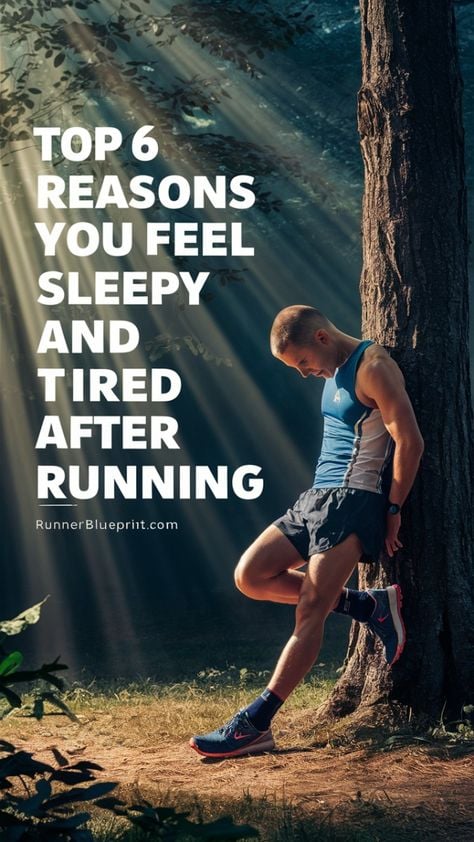If you’ve ever wondered why running makes you sleepy afterward, you’re not alone!
Feeling tired after a run can be frustrating, especially when you want to keep your energy up for the rest of the day.
But don’t worry—this happens for some common reasons, and understanding them can help you fix the issue.
As a running coach, I’ve seen many runners deal with post-run fatigue, and most of the time, the solution is simpler than you think.
In today’s article, we’ll explore the top reasons why you might feel sleepy after running and what you can do to stop it.
Eat Well
Poor nutrition is one of the most common reasons runners feel sleepy after running. Your body needs fuel to power through a run and recover afterward. If you’re not eating the right foods or running on an empty stomach, it’s no wonder you feel drained.
What to do:
Before running, ensure you’re fueling your body with carbs to give you sustained energy. For example, I like eating a banana or toast with peanut butter about 60 minutes before I hit the road. It’s light enough to not upset my stomach but packed with enough energy.
Some other great pre-run snack options include:
- A granola bar
- A slice of toast with jam
- Oatmeal with fruit
Planning to run for more than 90 minutes? Have gels, sports drinks, and other fuel to keep your energy levels up.
As a guideline, take about 100 calories after 60 minutes of running, then and then 100 every 30 to 45 minutes.
Then, following your workout, replenish your stores as quickly as possible.
Your muscles are most receptive to nutrients the first 30 minutes after exercise. By eating soon, you may reduce your risks of muscle soreness and fatigue.
Here are some great post-run meal ideas:
- Egg omelet with avocado spread on toast.
- Salmon with sweet potato.
- peanut or almond butter on whole-wheat bread
- Oatmeal with fruit
- Cottage cheese and fruit
- Oats with milk and dried fruit
- Veggie omelet with a slice of whole-grain bread
- Pretzels with nuts and fruit
- Yogurt with granola
- A hard-boiled egg with fruit
- Brown rice with chicken or salmon and veggies
- Tuna salad sandwich on whole-grain bread.
- Tuna and crackers.
Drink Your Water
Dehydration is another major reason for feeling sleepy after running. Even a little dehydration can leave you feeling sluggish and tired. When you run, you lose water through sweat, and not replenishing that water can lead to fatigue.
Don’t take my word for it.
During an experiment reported by the Journal of Nutrition, researchers assessed the mental skills of 25 subjects who had enough water to stay sufficiently hydrated or were put into a lightly dehydrated state.
The mildly dehydrated group reported symptoms such as headache, loss of focus, low mood, and a sense of fatigue both at rest and during exercise.
What to do:
Ensure you’re drinking plenty of water throughout the day, especially before, during, and after your run. I always tell my runners to aim for at least 64 ounces of water daily, and more if it’s hot or you’re doing a longer run.
You should also check the color of your urine. If it’s pale yellow or clear, you’re hydrated. If it’s darker, it’s time to drink more water!
What’s more?
Don’t forget about electrolytes, either. On longer runs or hot days, it’s a good idea to drink an electrolyte replacement drink to replenish lost minerals like sodium and potassium. This can help keep your energy levels steady and prevent that post-run slump.
Sleep Enough
There was a time when I thought I could function perfectly fine on five or six hours of sleep, even while training for a marathon.
I was wrong.
The less sleep I got, the more I felt like a zombie after every run. One week, after back-to-back hard workouts and very little sleep, I couldn’t shake the feeling of exhaustion.
I realized that my body wasn’t just tired but begging for rest.
What to do:
So how much is enough sleep?
Shoot for at least seven to eight high-quality hours of sleep a night. That’s the recommended amount for most adults, but feel free to sleep more on your hard training days.
Again, listen to your body and follow your judgment. Your body is your coach—as long as you’re willing to listen and follow its commands, you’ll be on the right way.
Avoid Overtraining
Overtraining is another common culprit of post-run fatigue. You’ll quickly hit a wall if you’re running too much, too fast, or too often without giving your body enough time to recover.
I learned the hard way that pushing too hard, too often, doesn’t make you stronger—it breaks you down. While training for my first half marathon, I thought I had to run fast every time I laced up.
But after a few weeks, I felt exhausted, achy, and unmotivated. That’s when I realized I was overtraining.
What to do:
Ensure you’re building enough recovery into your training plan. This means taking at least one or two rest days per week and alternating between hard and easy running days.
For example, after a long run or an intense speed workout, give your body a chance to recover with an easy, low-mileage run or a day of cross-training. I like to switch it up with cycling or swimming on my recovery days.
You should also keep track of overtraining symptoms. Some of the early signs include:
- Insomnia or difficulty falling asleep
- Mediocre athletic performance
- Persistent aches and pains
- Loss of appetite
- Elevated heart rate
- Lack of exercise motivation
- Sickness or compromised immune system
- Persistent soreness.
If you find yourself dealing with more than a few of these, give your body the recovery that it desperately needs.
Check Your Medication
Certain medications can cause drowsiness and fatigue, which might be why you feel sleepy after running.
Some of these include:
- Antidepressants, such as Zoloft and Prozac, can cause excessive fatigue, making it hard to summon up the motivation to run.
- Antihistamines – Brompheniramine, diphenhydramine, and hydroxyzine, among others, are all used to treat allergies.
- Anxiety medications – such as Klonopin, Xanax, Ativan, and Valium have the side effect of making you feel weak or tired for a few hours to several days.
- Blood pressure. Beta-blockers, like Tenormin, Toprol XL, and Lopressor, work by slowing your heart, making you feel tired during the workout and afterward.
What to do:
If you suspect your medication is making you tired, talk to your doctor about adjusting your dose or finding an alternative that won’t leave you feeling so tired.
Never stop or change medication without consulting your healthcare provider first. Your doctor may be able to recommend a different medication or timing that works better with your running routine.
You have got a Medical Condition.
If you’re consistently tired after running, even after adjusting your nutrition, hydration, sleep, and recovery habits, it might be time to consult a doctor.
Blood sugar issues, such as prediabetes and diabetes, can also contribute to fatigue and sleepiness, especially if your blood sugar drops after training.
Different infectious diseases, such as Lyme disease, herpes virus, or Epstein-Barr virus, can induce fatigue as your body fights the infection.
What to do:
If you’re concerned about ongoing fatigue, schedule a check-up with your doctor to rule out any underlying health problems. Sometimes, a simple blood test can provide the answers you need.
In general, consult your doctor for fatigue if it has lasted for many weeks and these other symptoms accompany it:
- Blurry vision
- A mix of constipation, feeling cold all the time, weight gain, and dry skin
- Depression, anxiety, or feelings of severe stress
- Insomnia, or frequent episodes of interrupted sleep
- Frequent and severe headaches
- Recent and unwanted weight gain
- Unexplained weight loss or gain
- Inability to urinate
- Suicidal thoughts
- Abnormal bleeding, including vomiting blood or bleeding from your rectum
When To Nap After a Run
So, should you take a nap after a workout?
The answer depends on you and your body. If a quick nap will help get you back on track, why not.
But if you’d rather keep moving, then go for it.
I’ll admit there are still days when I feel sleepy after a run, even when I’ve done everything right. On those days, I’ve learned to listen to my body and take a quick nap. A 20-minute power nap can work wonders and leave me feeling refreshed instead of groggy. The key is not to nap too long, or I’ll wake up feeling even more tired.
Decided to nap? Then make the most out of it by doing the following:
- Post-Run ritual. Drink plenty of water and stretch your muscles first, then shower—all before you nap. Without a proper post-run ritual, your muscles may start to cramp while you nap.
- Nap At The Right Time. Avoid napping later in the day. Time it at around 1:00 p.m. and 3:00 p.m.—which works great if you usually run in the morning or around noon.
- Cap The nap. Limit your naps to 20-30 minutes. Doze off for longer, and you might fall into a deep sleep, then wake up with sleep inertia. The longer the nap, the more you risk feeling groggy afterward.
- Set The Alarm. Now you have the perfect nap time; it’s time to make the most of it. Start by setting the alarm to help nail those 20 minutes.
- The Right Environment. For the perfect 20-minute nap, you want a quiet, dark place with a comfortable room temperature to lie down. Feel free to use earplugs, eye masks, or white noise to help tune out distractions.
Share Your Experience: Do You Feel Extra Tired After Running?
Feeling sleepy or worn out after a run is more common than you might think, and everyone’s experience with post-run fatigue is unique. Whether it’s a gentle fatigue that helps you relax or an overwhelming tiredness that disrupts your day, I’d love to hear
How do you feel after a run? Have you found any tips or recovery techniques that help you feel more energized? Maybe you’ve discovered a favorite post-run snack or routine that helps you bounce back faster.
Share your experiences, challenges, and recovery tips in the comments below—your insights could make a difference for fellow runners!


